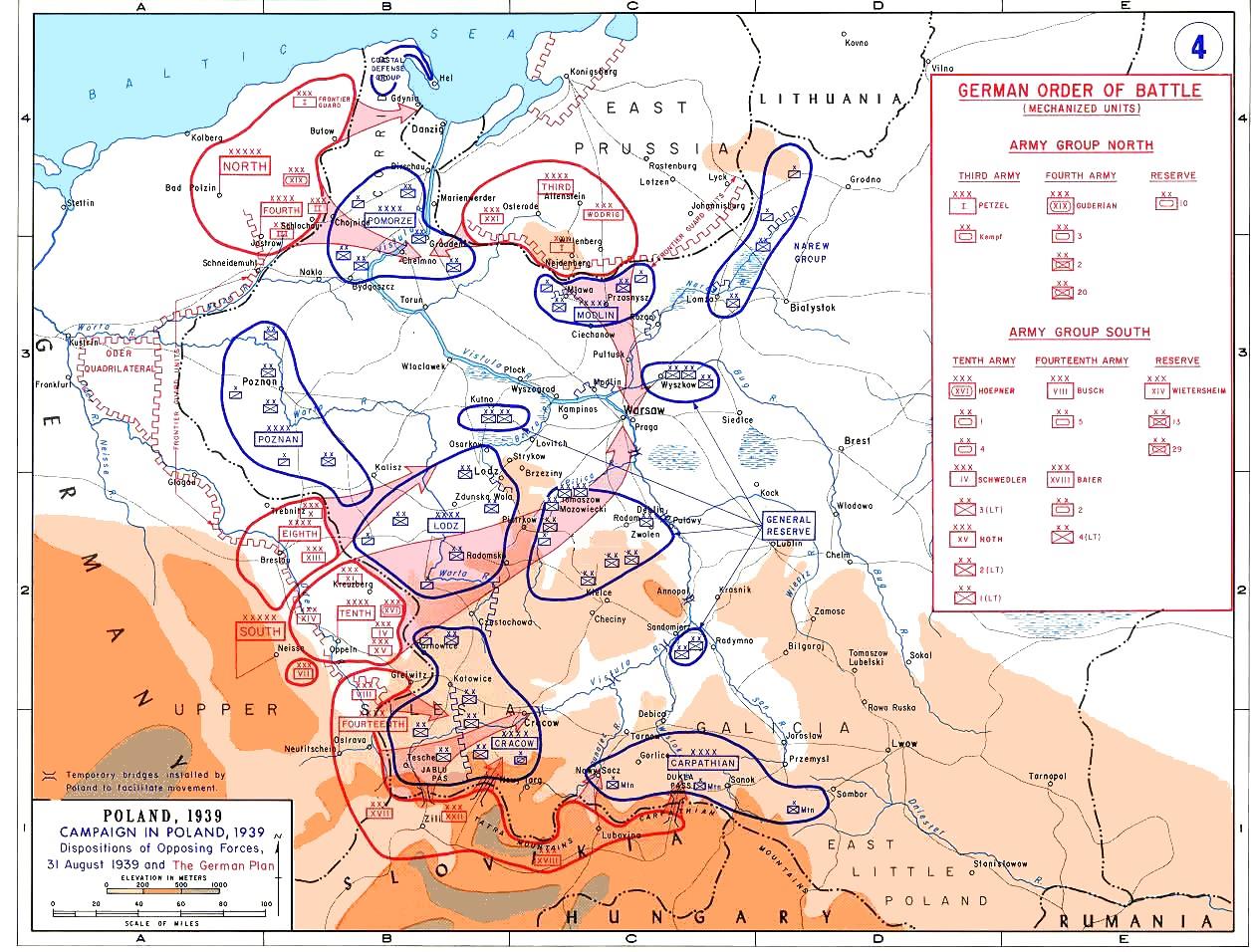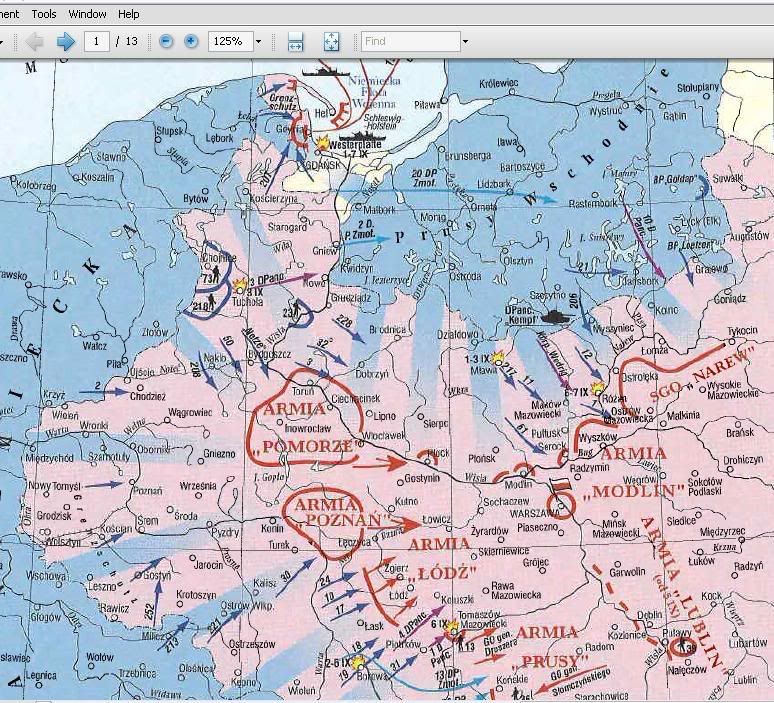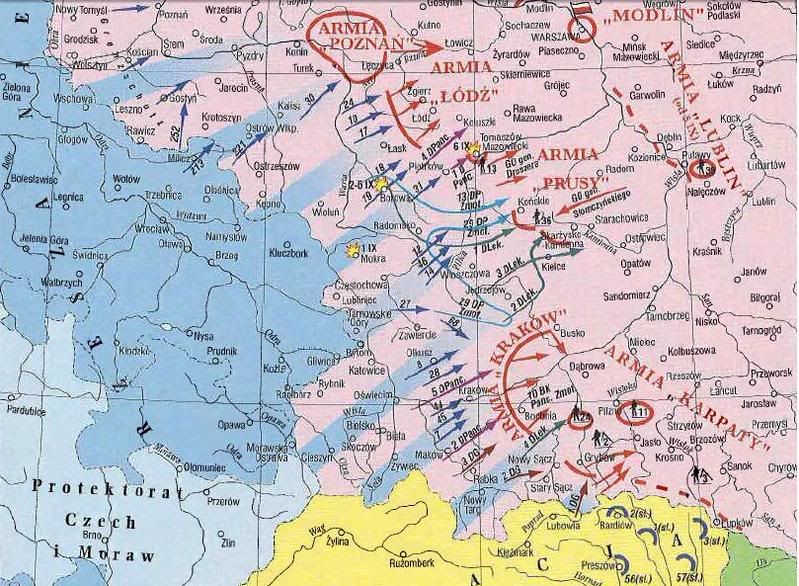Heh, technically correct.Bronsky wrote:And by 5 September, the Germans were across the Vistula
Only in these two places:
Heh, technically correct.Bronsky wrote:And by 5 September, the Germans were across the Vistula
...which was still very bad knews given how the bulk of the Polish army had been deployed for a cordon defense.Domen121 wrote:Heh, technically correct.Bronsky wrote:And by 5 September, the Germans were across the VistulaBut let's take a look where exactly were the Germans across the Vistula on 05.09.1939:
Only in these two places:


There is no question that they lied to the Poles. They did lift a finger, though not much more than that.chili wrote:As I see it, the problem is not that the French did not lift a finger to help the Poles, but that they lied about it, prior to the German invasion of Poland and during.
I don't remember that comment - which doesn't mean I don't believe you, of course - but... so what? Britain itself wasn't exactly bending over backward telling the Poles that they were doomed. The British had extended a guarantee to Poland at a time when their best war plans included having all of two divisions in France by the end of the first month of hostilities.chili wrote:The Kasprzycki-Gamelin Convention signed in may 1939 gave Poles false hopes. And did not general Ironside comment the convention by saying that the French are fooling the Poles, since the French had no intentions to help Poland military in the first phase of the war.
At that point, the French position was that Poland was beyond rescue and the only thing they could offer was comforting words. Given my own rather low opinion of Gamelin, I'd tend to attribute his action to mere selfishness i.e. get the Poles off his back.chili wrote:On the 8 of September Gamelin received a message from Rydz-Smigly, the Polish High Commander, in which he asked the Frenchmen what kind of actions the French military had taken. The answer was full of lies.
I agree.So everybody was lying to everybody else, and the only reason why the Poles were prepared to believe such promises was that they were desperate, just like the French seriously discussed the possibility of US belligerency in June 1940, based on comments by the US ambassador that were hinting at far more than Roosevelt was prepared to deliver. In both cases, the hard reality wasn't exactly a state secret but desperate people will grasp at straws.
Of course the French thought that the situation in Poland was beyond rescue, the French saw what they wanted to see. What they needed to see to remain passive. But France was already at war with Germany and should have acted despite whatever situation in Poland. After the 3 of september the question was no longer to rescue Poland but to defeat Germany.At that point, the French position was that Poland was beyond rescue and the only thing they could offer was comforting words.
If in fact the French army would have hurled it self against the Germans, then there wouldnt be a problem with Gamelin lies, I agree but isnt that obvious?But I must disagree that the problem was Gamelin lying. Certainly, from the Polish point of view the problem was lack of a second front in the west, not Gamelin's lies.
Yes, that is 100% correct.They were hoping that Germany would collapse due to the pressure of an economic war,war without casualties .
Maps from the West Point WWII Atlas
Army "Cracow" was not shattered yet, it started withdrawal from Silesia. And unfortunately these American maps you posted are not very accurate. For example - they don't show the Northern Front, which on 17.09.1939 consisted of many divisions. It seems that maps are based on German sources only, thus they don't present positions / strength / numbers of Polish forces accurately. Another example - Robert Kennedy claims 12 Polish divisions and 3 cavalry brigades trapped inside the Bzura pocket, while in fact there were only 8 divisions and 2 cavalry brigades there.This shows that the two crosses in your map correspond to armies Cracow and Pomorze being shattered.


Situation was going very badly for the Poles by the end of the first week, here I agree. However, in May 1940 situation was also going very badly for the French by the end of the first week, yet the British allies didn't abandon them.but it quickly - and I do mean very quickly - became clear that the situation on the ground was going very badly for the Poles.
Warsaw was in serious trouble after 07.09.1939, when Germans defeated divisions of Northern Grouping of Army "Prusy" during the battle of Piotrkow Trybunalski - Tomaszow Mazowiecki, opening their way to Warsaw:This shows the southern part of the Polish front in tatters and Warsaw in serious trouble by 5 September.
Thank you very much for your maps, most interesting. I don't think they change the gist of my argument, however, which was that even before the French offensive started, the Poles were already in serious trouble and the Allies would know that. They would have inflated claims of victory from OKW communiqués on one hand, and Polish admissions that they were in full retreat on the other, plus the known fact that the corridor was completely German.Domen121 wrote:Army "Cracow" was not shattered yet, it started withdrawal from Silesia. And unfortunately these American maps you posted are not very accurate. For example - they don't show the Northern Front, which on 17.09.1939 consisted of many divisions.
The main reason why the British didn't was that they were already there! So things were going exceedingly badly for the French and the British. The French had lost the battle 3-4 days after it started, though outside observers wouldn't have been able to tell until a few more days. The extent of the Polish disaster was more quickly apparent, that doesn't mean Poland collapsed more quickly.Domen121 wrote:Situation was going very badly for the Poles by the end of the first week, here I agree. However, in May 1940 situation was also going very badly for the French by the end of the first week, yet the British allies didn't abandon them.
In the peaceful 1920's, the British government fondly imagined that Britain would provide naval and air power to back up France's land power, in the event of a future European war - so no BEF would be sent to France at all.Bronsky wrote:The main reason why the British didn't was that they were already there! So things were going exceedingly badly for the French and the British. The French had lost the battle 3-4 days after it started, though outside observers wouldn't have been able to tell until a few more days.Domen121 wrote:Situation was going very badly for the Poles by the end of the first week, here I agree. However, in May 1940 situation was also going very badly for the French by the end of the first week, yet the British allies didn't abandon them.
Uh..? ... What if the British had sent a BEF like in WWI? .... Impossible I say, their cadre was too small to build and field six or seven combat ready divisions. In any case politcal considerations would never allow such a deployment as in 1914. And, if such a BEF had been sent it would have simply been a handover of 100,000+ PoW to the Germans. There is absolutely no way a BEF deployed deep into Belgium could have escaped the debacle of the French armies left wing. The decision to retreat to the coast would never have been made in time by the slow witted British generals, such a Brit force never would have had the motorization to race the panzers to the coast. And, what would the few who reached the coast have found when the got there? A few cargo ships and destroyers sinking under the Luftwaffes bombs? Sorry miracles dont happen in the 20th Century. There is just not enough fairy dust in the universe to overcome the sillyness in a WWII BEF concept.Tim Smith wrote: In the peaceful 1920's, the British government fondly imagined that Britain would provide naval and air power to back up France's land power, in the event of a future European war - so no BEF would be sent to France at all.
Had the British followed that plan in 1939-40, and given the British Army only half or less of the resources it got historically (using them to build up the RAF instead) it is very unlikely that Britain would have agreed to send even one or two divisions to France a week after the German attack on May 10 1940.
Then we'd be talking about how Britain abandoned France.....
You've misread my post.Carl Schwamberger wrote:Uh..? ... What if the British had sent a BEF like in WWI? .... Impossible I say, their cadre was too small to build and field six or seven combat ready divisions. In any case politcal considerations would never allow such a deployment as in 1914. And, if such a BEF had been sent it would have simply been a handover of 100,000+ PoW to the Germans. There is absolutely no way a BEF deployed deep into Belgium could have escaped the debacle of the French armies left wing. The decision to retreat to the coast would never have been made in time by the slow witted British generals, such a Brit force never would have had the motorization to race the panzers to the coast. And, what would the few who reached the coast have found when the got there? A few cargo ships and destroyers sinking under the Luftwaffes bombs? Sorry miracles dont happen in the 20th Century. There is just not enough fairy dust in the universe to overcome the sillyness in a WWII BEF concept.Tim Smith wrote: In the peaceful 1920's, the British government fondly imagined that Britain would provide naval and air power to back up France's land power, in the event of a future European war - so no BEF would be sent to France at all.
Had the British followed that plan in 1939-40, and given the British Army only half or less of the resources it got historically (using them to build up the RAF instead) it is very unlikely that Britain would have agreed to send even one or two divisions to France a week after the German attack on May 10 1940.
Then we'd be talking about how Britain abandoned France.....
I don't recall reading anything like that. The RAF was probably fondly imagining war with France though ...Tim Smith wrote: In the peaceful 1920's, the British government fondly imagined that Britain would provide naval and air power to back up France's land power, in the event of a future European war - so no BEF would be sent to France at all.
It may be unlikely that France would give a guarantee to Poland in that event. And then we'd be talking about how France abandoned Poland, oh.Had the British followed that plan in 1939-40, and given the British Army only half or less of the resources it got historically (using them to build up the RAF instead) it is very unlikely that Britain would have agreed to send even one or two divisions to France a week after the German attack on May 10 1940.
Then we'd be talking about how Britain abandoned France.....